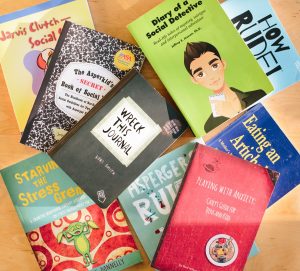Resources to Use with Children for Developing Social Cognition
Comic Strip Conversations, by Carol Gray
Technique developed by Carol Gray to help people with autism develop greater social understanding/ Stick-figures combined with “conversation symbols” provide visual representations of the different levels of communication that take place in a conversation, which make the more abstract aspects of social communication more concrete and easier to understand
It’s All About the Story! An Interactive Guide using Story Grammar Marker® for Parents and Educators of Children with Asperger’s Syndrome, Autism and Related Communication Disorders, by Maryellen Rooney Moreau
How to use Story Grammar Marker® methodology to help children develop social communication with the goal of facilitating relationships at school, during academic activities and at home.
Making Connections! Perspective-Taking, Theory of Mind and Pragmatics Using the Critical Thinking Triangle® of the Story Grammar Marker®, by Maryellen Rooney Moreau
Visual, explicit, research-based lessons, activities and projects that use Critical Thinking Triangle® in academic and social situations for perspective-taking, Theory of Mind, critical thinking, pragmatics (social uses of language), inferencing and characters’ and personal motivations
 Power Cards: Using Special Interests to Motivate Children and Youth with Asperger Syndrome and Autism, by Elisa Gagnon.
Power Cards: Using Special Interests to Motivate Children and Youth with Asperger Syndrome and Autism, by Elisa Gagnon.
Step-by-step book that shows parents and educators how to help change an unwanted or inappropriate behavior by capitalizing on the special interests that characterize children and youth with Asperger Syndrome
Social Behavior Mapping: Connecting Behavior, Emotions, and Consequences Across the Day, by Michelle Garcia Winner
Visual flowchart used to “map” the consequences of any behavior in any situation (good or bad) and bring to light the perspectives of everyone affected by the behavior/ Illustrates concept of the Social Emotional Chain Reaction, i.e. how we act affects how others feel, how we make others feel affects how they treat us, how we are treated affects how we feel about others and, ultimately, how we feel about ourselves
Social Skills Training for Children and Adolescents with Asperger Syndrome and Social-Communications Problems, by Jed Baker
Author’s years of experience working with students with Asperger Syndrome and social-communication difficulties are translated into valuable resource/ 70 of the skills that most commonly cause difficulty for individuals with autism spectrum disorders and social-communication problems plus activity sheets listing ways teachers and parents can demonstrate, practice and reinforce each skill in the classroom and at home
Superflex®: A Superhero Social Thinking Curriculum, by Michelle Garcia Winner
Three-part cognitive behavioral curriculum that provides educators, parents and therapists fun and motivating ways to teach students with social and communication difficulties/ Helps students develop further awareness of their own thinking and social behaviors and learn strategies to improve self- regulation across a range of behaviors
The Incredible 5-Point Scale, The Significantly Improved and Expanded Second Edition; Assisting Students in Understanding Social Interactions and Controlling their Emotional Responses, by Kari Dunn Buron
Classic, instructional tool that supports emotional regulation and teaches children social and interpersonal abilities and emotional self-control
The Social Skills Picture Book/ Teaching play, emotion, and communication to children with autism, by Jed Baker
Uses photographs of students engaging in a variety of real-life social situations to teach appropriate social behaviors/ Photographs illustrate the “right way” and “wrong way” to approach a situation and positive/negative consequences of each and children role-play skills until confident enough to practice them in real-life interactions
The Social Times Volume 4, by Kari Dunn Buron (appropriate for children in grades 3 to 9)
Magazine format/ Main topics include: Introducing Yourself, Joining In, To-Do Lists, Sarcasm, Cyber Bullying, Rules for Eating, Tattling vs. Telling, Telling Jokes and Asking for Help
Think Social! A Social Thinking® Curriculum for School-Age Students, by Michelle Garcia Winner
Step-by-step methods for teaching social-cognitive and -communicative skills to students who have these challenges that affect their school and home life
We Can Make It Better! A Strategy to Motivate and Engage Young Learners in Social Problem-Solving Through Flexible Stories, by Elizabeth M. Delsandro
Short stories that help students learn how to make good choices – in their thoughts, actions and words – that result in improved social interactions
Worksheets for Teaching Social Thinking and Related Skills, by Michelle Garcia Winner
250 worksheets that offer specific lessons in teaching social thinking/ Majority of worksheets are for students in 3rd grade and higher, many are for middle and high school students and some are for K through 2nd grade/ The ideas can be used with adults as well
You are a Social Detective, by Michelle Garcia Winner
Entertaining comic book that offers different ways to teach children how to develop their own social detective skills and use their eyes, ears and brains to figure out what others are planning to do next, are presently doing and what they mean by their words and deeds
